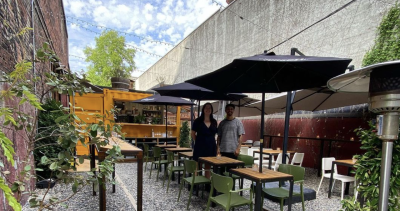B.C. RMT applies the human touch to cancer treatment
(This story is sponsored by the Registered Massage Therapists’ Association of B.C.)
Registered massage therapist Grace Dedinsky-Rutherford finds her greatest satisfaction in helping others. After graduating from UBC with a B.Sc. in physiology, she was accepted into the West Coast College of Massage Therapy. But just as she was about to embark on what should have been one of the most exciting periods of her life, her father was diagnosed with a grade-four geloblastoma brain tumour.
Devastated by the news, she considered quitting school so that she could help care for her dad. But with persuasion from her mother, who realized her father would be upset if she put her life on hold, she spent the next two years studying by day and looking after her father in the evenings. Near the end of his 22-month journey with surgery, radiation, and chemotherapy, his body was shutting down and his lymphatic system was backing up. So Dedinsky-Rutherford used what she had learned from her knowledge of combined decongestive therapy (CDT) to give him peace in those last few months. Unfortunately, he passed away just before her graduation.
Today, Dedinsky-Rutherford is a registered massaged therapist (RMT) and she considers it an honour and a privilege to have spent the last 26 years treating her patients.
“I think if you’ve been on the path with anybody with cancer, it’s the kind of experience you can’t just read in a book. You’ve lived it,” she says. “So when you look around the world and see all these people who are in such need, you have to make a decision of whether you can put yourself into that uncomfortable position that helps people.”
Dedinsky-Rutherford does not have an easy job. But having lived through the journey with her father she wants to be able to apply her skills and expertise to truly help people and make an impact. And she never stops learning and trying to increase her knowledge.
“After being in practice a couple of years I took on the role of being an educator in a massage therapy college,” she says. “As I worked in the college I started to revisit the huge impact manual lymph drainage has on patients with end stages of cancer, but also as they deal with the side effects of lymphedema from their surgery, radiation, and chemotherapy.”
Lymphedema is localized fluid retention and tissue swelling caused by a compromised lymphatic system, which often occurs in cancer patients. In order to better care for her patients, Dedinsky-Rutherford took four weeks of full-time studies with the Dr. Vodder School in Combined Decongestive Therapy for Lymphedema.
“Through my 26 years as a RMT in this province I have been honoured to help over 750 patients with lymphedema resulting from secondary cancer or born with primary lymphedema or lipedema. I have been in the position to assist people through those last stages of their lives and feel absolutely blessed to give them comfort. I have a ton of patients who I help by keeping their edema under control, so they live a happier, more comfortable life,” she says.
Several clinical studies show that massage can reduce symptoms such as stress, nausea, pain, fatigue, and depression in patients with cancer. Dedinsky-Rutherford also notes that it’s one form of treatment that feels good.
“It’s an environment that’s not so painful or sterile with bad memories of their chemotherapy or their radiation,” she adds.
But Dedinsky-Rutherford warns that people should be wary of someone who says they do manual lymphatic drainage but is not certified. That’s because if someone is not cognizant of a patient’s impaired lymphatic system, they could end up pushing fluid into an area that’s not going to accept it. Or worse, cause damage.
And when you’re putting your health in someone else’s hands—literally—it’s crucial that you know who you are receiving treatment from. The upcoming Registered Massage Therapists Awareness Week (October 22 to 29), serves as an important reminder to the public.
B.C. RMTs are regulated under the Health Professions Act. The Registered Massage Therapists’ Association of B.C. (RMTBC) advances the profession and provides evidence-informed, research-based practice information to registered massage therapists. From a public perspective, this means the public can be confident in the knowledge that when they see a RMT, they are trained, licensed, and insured.
“British Columbians have the enormous benefit of having very competent practitioners,” says Dedinsky-Rutherford. “We strive for professional development with our required continued education to expand our field of knowledge.”
While Dedinsky-Rutherford has focused on helping patients with cancer, massage therapy is beneficial to anyone of any age. In her opinion, it comes down to a basic human need for contact.
“Touch is a huge part of humanity. A RMT assures patients that they are being treated by someone who really cares about their well-being….And a lot of us really need that,” she says. “We’re so used to texting and very impersonal ways of getting information, so the one-on-one physical contact and the communication—someone actually listening to you and your stories—is so important.”
The Registered Massage Therapists’ Association of British Columbia will be hosting a conference in April 2019 entitled Registered Massage Therapy and Oncology: An Approach to Optimized Care. Visit the www.rmtbc.ca/ for more information.














